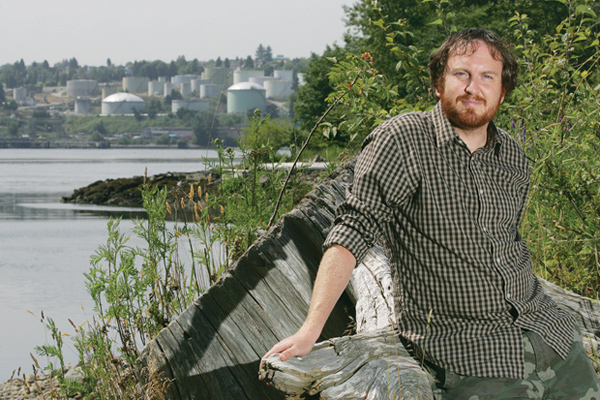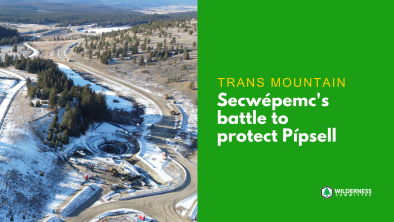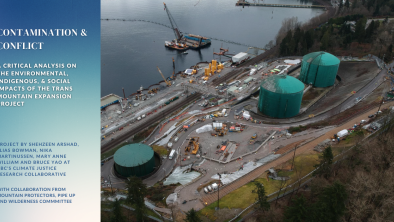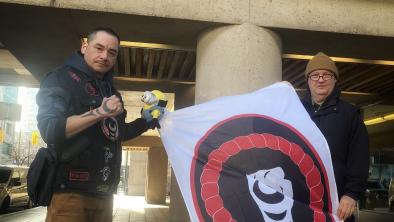Crude awakening
North Shore News

A planned oil pipeline expansion has sparked a fight for the future of Burrard Inlet
ON an expanse of land in northeast Alberta the size of the Chihuahuan Desert, some 100 oil sands deposits are dotted with the drills and derricks that dredge up an average of more than eight million litres of oil every hour.
The percolating black goldmine lies under the steel-toed boots of nearly 139,000 Albertan workers charged with bringing it to the surface. All told, there may enough oil - and jobs - to last four centuries.
Historically, the lion's share of that province's liquid bounty has gone to the United States, which today guzzles some 1.4 million barrels of Alberta oil daily. But as demand from Asia increases, producers have increasingly looked to ship their product westward. That means getting past British Columbia - and, perhaps more importantly, British Columbia's coast.
If a pair of plans to dramatically expand the amount of petroleum crossing our province come to fruition, much of that increased flow will pass through our own Burrard Inlet. A growing chorus of voices is warning that that change spells disaster for local waters.
. . .
With the salt smell of the Strait of Georgia in her nose, Trish Boyum, a co-owner of Ocean Adventures Charter Company, has spent 15 years showing travellers the black bears and humpback whales emblematic of B.C.'s rugged beauty.
Ever since she first laid eyes on B.C.'s coast, she has known it was something that should be shared - and protected. But a new proposal that would see hundreds of huge oil tankers plying coastal waters on a nearly daily basis threatens to put an end to Boyum's efforts, she says - and to her way of life.
"This part of the world, once we had explored it, we knew that we had to just keep coming back, and we wanted to show it to other people so that they would want to help preserve it," says Boyum. "We know that we won't be able to operate here if (the tankers) come. It'd be too dangerous."
The Western Canadian oil company Enbridge is proposing a pipeline beginning just north of Edmonton, running nearly 1,200 kilometres west and snaking through Burns Lake before terminating near two ship berths waiting in Kitimat. The oil pipeline would have the capacity to move 525,000 barrels each day, primarily for U.S. and Asian markets.
That oil will be carried by approximately 220 double-hulled tankers each year if Enbridge's proposal is approved. The tankers range from the 80,000 tonne Aframax to the Very Large Crude Carrier, which is 344 metres long with a deadweight of 320,000 tonnes. The proposal calls for a second pipeline to carry bitumen, the thickest form of petroleum, back to Alberta.
The beginning of the joint review panel of Enbridge's Northern Gateway Pipeline proposal is slated for July 30.
Paralleling that company's efforts, Texas oil giant Kinder Mor-gan is planning a $4.1-billion expansion of its 60-year-old TransMountain pipeline, increasing capacity from 300,000 barrels a day to 750,000 by 2017. That conduit carries crude oil from the Alberta tar sands to the Westridge Terminal on the south side of Burrard Inlet. Its expansion would require a more-than-tripling of the tanker traffic in our local waterway, from approximately eight shipments per month to as many as 30.
With one application in front of regulators at the National Energy Board and its field study underway, Kinder Morgan Canada is in the early stages of attempting to win approval for the plan. The $90 billion company has said it will apply to build the pipeline in late 2013.
For the past two years, Boyum has been working to oppose the proposed increase in tanker traffic on the coast. She is not alone in her efforts.
Ben West, healthy community campaigner with the Wilderness Committee, a Western Canadian environmental group, says the pipeline plans pose a grave threat both to the land and waters along the pipeline routes, and to the coast itself.
"The risks associated with spilling are something that we're just starting to understand," he says.
West cites examples from recent history to illustrate his point, and to call into question the assurances of the proponents that the new lines would be safe.
In June last year, a faulty gasket caused 230,000 litres of oil to gush from Enbridge's Athabasca pipeline in northern Alberta. And in 2010, a rupture of another of the company's pipelines spilled 2.9 million litres of diluted bitumen into a tributary of the Kalamazoo River in Michigan.
"Bitumen's very heavy and it sinks to the bottom," says West. "It stays there in the ecosystem for a very long time."
In a 2010 government memo, an environmental assessment officer said the Northern Gateway pipeline could pose a danger to 15 at-risk species including the yellow toad, rusty blackbird, and woodland caribou.
"All of us who are working on both of these projects are trying to stop the West Coast being turned into an export terminal," says West.
But officials with Port Metro Vancouver, which oversees commercial traffic in Burrard Inlet and other nearby areas, say the fears voiced by West and others - around tanker traffic, anyway - are misplaced. Harbour master Yoss Leclerc points out that every safety precaution that can be taken is being taken.
"I'm the father of two girls; I use West Vancouver beaches. I go to Cates Park in the summer, and my first concern is about the environment," says Leclerc, the director of operations security for the port.
With approximately eight oil tankers already docking in the harbour per month, Leclerc says the proposed increase in traffic does not pose a risk.
"I went around the world and in terms of tankers," he says, "what we have here in a year is what they have in (the Strait of) Gibraltar in one day."
Weighing a maximum of 110 deadweight tonnes, the Aframax oil tankers are the largest vessels to dock in Port Metro Vancouver, and they also face the most stringent safety regulations, says Leclerc. Tankers are also escorted by tugs.
"The tugs that we see today, it's day and night compared to what we had 20 years ago. They're more maneuverable, they're more powerful," Leclerc explains. "If the ship loses power or loses manoeuvrability . . . the tug would be there to escort her."
In the event of a spill, the Canadian Coast Guard will be quick to the scene, according to Leclerc.
"Within an hour you will have . . . equipment in place and people starting work," he says, adding that some locations could be attended to inside of 10 minutes.
But while West applauds some of the precautions in place, he argues the risk of a single misstep is too great.
"There's no policies that you can put in place that prevent human error or major, what you could call, acts of God," he says, listing high-profile marine disasters. "If you look at the Queen of the North or the Exxon Valdez, this wasn't because of too many tugboats or not enough tugboats, it was because somebody made a mistake."
Recent funding cuts may also lead to a sluggish response to a spill, according to West.
"The Coast Guard station in Kitsilano being shut, it's not specifically for the sake of dealing with oil spills, but if you have any major accident or incident, the Coast Guard are clearly the first responders and the people who have the most local knowledge."
It's unclear whether the concerns raised by West and other activists will sway policy makers, but at the federal level, it seems unlikely the message will change minds. In an open letter earlier this year, Minister of Natural Resources Joe Oliver declared support for the projects and condemnation of worries over their potential environmental impact.
"As a country, we must seek new markets for our products and services and the booming Asia-Pacific economies have shown great interest in our oil, gas, metals and minerals," wrote Oliver. "Unfortunately, there are environmental and other radical groups that would seek to block this opportunity to diversify our trade. Their goal is to stop any major project no matter what the cost to Canadian families in lost jobs and economic growth."
Oliver called for quicker, streamlined reviews of major projects and to guard against radical ideologues looking to hijack the review process and cause indefinite delays.
At the provincial level, the government seems more ambivalent. B.C. Premier Christy Clark has attracted criticism recently for her refusal to take a strong position with the joint review panel. Alberta will be there as a participant, but B.C. has only applied for intervenor status, which restricts the province from introducing evidence.
"The official position of the British Columbia government is that we will let the process go ahead, and watch with intense interest," says North Vancouver-Seymour Liberal MLA Jane Thornthwaite, adding that we do need to get our oil from somewhere.
That said, Thornthwaite acknowledges that her constituents have contacted her to voice concerns - particularly over the northern Enbridge pipeline - and she questions the economic benefits of the plans. B.C.'s economy has been resilient, but that resilience is not due to oil, according to Thornthwaite.
"Tourists come from all over the world to visit that beautiful area," Thornthwaite says, discussing Boyum's wilderness tours. "Obviously, if there was anything to (damage) that pristine environment, it would negatively affect not just their businesses but everybody else's business as well as the First Nations' way of life."
The northern pipeline will produce 560 long-term jobs in B.C. according to Enbridge. Still, that economic boost doesn't tip the scales of risk vs. reward for Thornthwaite.
"The amount of jobs that we would get, certainly on its own, would not be a reason to risk our shores," she says.
The MLA's comments echo West's view of the economic side of the equation.
"To be clear, the new Kinder Morgan pipeline is entirely about export, it's not about our local consumption," he says. "My biggest fear, is that really, the biggest number of jobs would be in dealing with the cleanup if there's an oil spill."
Boyum's not sure what impact her efforts will have, but for her business, for her colleagues and for her love of seafood, she says she'll continue to oppose the tankers.
"Hopefully, the people of British Columbia are going to really wake up and see that it has to be stopped."


